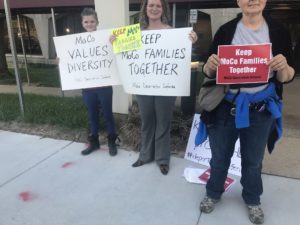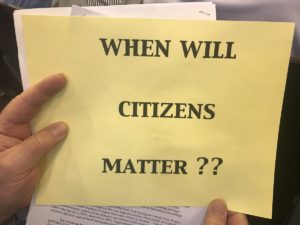
Immigrants’ Rights Group Objects to County’s Funding Proposal
An immigrants’ rights organization that was in line to receive a Montgomery County grant to provide legal representation to residents who face deportation has rejected changes to the proposal and doesn’t want the money.
“Not as it stands right now,” said Claudia Cubas, litigation director at Capital Area Immigrants’ Rights Coalition, on Monday.
“If they don’t want the money, they don’t have to take it,” Councilmember George Leventhal said.
The County Council on Tuesday will vote on a $374,000 special appropriation that would provide legal representation to county residents who face deportation.
About 86 percent of immigrant and asylum-seeking detainees go to court without legal representation, a statement from CAIR said. The Montgomery County funding would pay to represent about 85 to 90 individuals from three attorneys and two legal assistants, the organization said.
The proposal would have excluded taxpayer-supplied attorneys from individuals who have been convicted of certain crimes. But State’s Attorney John McCarthy expressed a concern about the how the representation would proceed.
If someone to fight a deportation based a criminal conviction, they would have to attack the underlying conviction, McCarthy said in a statement.
“What that means is that a conviction fairly and honestly obtained using taxpayer money in Montgomery County would be subject to re-litigation and retrial on matters that the victim thought was long settled,” he wrote.
The original victims “would be revictimized by the process,” he said.
Cubas said McCarthy’s concerns “wouldn’t have materialized because they have not materialized in the programs we’ve had for several months now.”
McCarthy also raised concerns about the crimes left out of the original list — crimes that included domestic violence, which typically are prosecuted in Maryland as second-degree assault. Although second-degree assault is a misdemeanor, it carries a maximum penalty of 10 years in prison. Other crimes left out included multiple forms of child abuse, handgun offenses, child pornography, human trafficking, gang related crimes, first-degree assault and drug distribution, McCarthy said.
Cubas called the newly added crimes a “blanket carveout without even the most basic forms of humanitarian relief.”
“The focus of our proposal was to represent people in immigration proceedings to allow them the put forward the defense our laws allow them to do,” she said.



Engage us on Facebook
Follow us on Twitter
Tweets by @mymcmedia